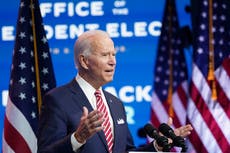Biden unlikely to cancel student loan debt, report claims
White House budget unlikely to include campaign plans for cancellation as administration mulls executive authority to eliminate federal debt
Your support helps us to tell the story
From reproductive rights to climate change to Big Tech, The Independent is on the ground when the story is developing. Whether it's investigating the financials of Elon Musk's pro-Trump PAC or producing our latest documentary, 'The A Word', which shines a light on the American women fighting for reproductive rights, we know how important it is to parse out the facts from the messaging.
At such a critical moment in US history, we need reporters on the ground. Your donation allows us to keep sending journalists to speak to both sides of the story.
The Independent is trusted by Americans across the entire political spectrum. And unlike many other quality news outlets, we choose not to lock Americans out of our reporting and analysis with paywalls. We believe quality journalism should be available to everyone, paid for by those who can afford it.
Your support makes all the difference.Joe Biden is unlikely to include his campaign plans for student debt cancellation in the proposed White House budget, as the administration remains focused on other priorities already outlined in his $4 trillion domestic agenda.
The exclusion is among several other campaign pledges jettisoned from his first budget outline, including a public option for health coverage and a plan to cut prescription drug costs, according to The Washington Post. The full 2022 budget proposal is due on 27 May.
In an interview with David Brooks of The New York Times, the president also appeared to dismiss progressive demands to cancel student loan debt, pointing to federal loan borrowers at high-cost private universities, which make up less than 1 per cent of federal borrowers.
He said: “The idea that you go to Penn and you’re paying a total of 70,000 bucks a year and the public should pay for that? I don’t agree.”
The president pledged to cancel up to $10,000 in federal loan debt before he entered the White House, adding that it “should be done immediately” upon taking office. Meanwhile, a large group of congressional Democrats including progressive leadership and Senate Minority Leader Chuck Schumer have pushed for canceling up to $50,000 in debt per borrower.
The president has extended the coronavirus pandemic pause on federal student loan payments through September, and his Education Secretary Miguel Cardona has rolled back a policy implemented by his predecessor Betsy DeVos to provide full debt relief for 72,000 borrowers defrauded by for-profit schools.
During his campaign, Mr Biden proposed a debt relief plan that would cancel up to $10,000 of undergraduate or graduate student loan debt for every year of national or community service, up to five years.
“Individuals working in schools, government and other non-profit settings will be automatically enrolled in this forgiveness program; up to five years of prior national or community service will also qualify,” according to the plan.
He also modelled a plan from Senator Bernie Sanders and US Rep Pramila Jayapal to cancel federal student loan debt for borrowers from public colleges and universities earning up to $125,000 per year, including students from private Historically Black Colleges and Universities, in an effort to close the racial wealth gap.
The education platform outlined in his American Families Plan would provide up to two years of tuition-free community college and universal preschool, but it does not include the measures outlined during his campaign.
His higher education plan aims to ease future student loan debt burdens, but it doesn’t propose eliminating it entirely. His Education Department and the Department of Justice are reportedly mulling whether the president has authority to cancel student loan debt through executive action.
The White House has also urged Congress to eliminate debt through legislation, which would face immense opposition from congressional Republicans and likely fail in an evenly divided Senate, unless Democrats attached a provision through a budget reconciliation process as they did to pass the American Rescue Plan.
According to the Federal Reserve, more than 45 million Americans hold more than $1.7 trillion in student loan debt, a figure that has surged by more than 100 per cent within the last decade as private university enrollment grew and federal and state governments made steep cuts to higher-education funding against growing wealth inequality.
Most of that debt – $1.5 trillion – is in federal loans.
In a statement to The Washington Post, White House budget spokesman Rob Friedlander said that “the President’s budget will focus on advancing the historic legislative agenda he’s already put forward for this year”.
“The budget won’t propose other new initiatives but will put together the full picture of how these proposals would advance economic growth and shared prosperity while also putting our country on a sound fiscal course,” he said.






Join our commenting forum
Join thought-provoking conversations, follow other Independent readers and see their replies
Comments